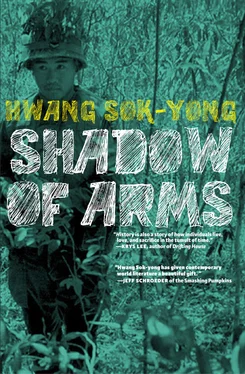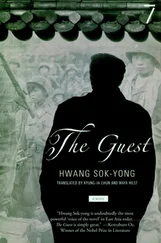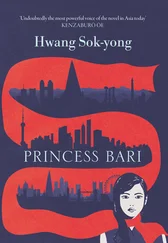The woman said nothing. They just went on smoking. She looked up at the clock.
“I need to make a call. If it gets any later, these people will take their siesta. I can’t wait another two hours in a place like this.”
“Don’t worry.”
Yong Kyu also glanced at the clock. He paused, then casually asked her, “Do you know Madame Lin well?”
She responded indifferently. “A little. I worked there a while after I was fired.”
“As a bar girl?”
“Is it a crime?” she retorted angrily. “I can’t go home empty-handed. I’m no different than the rest of you. And I’m not a whore.”
Her outburst made Yong Kyu uncomfortable. He hung his head a little. “Why not go to America?”
“What do you care?” the woman asked, fixing her eyes on his. “Stay out of my business. What difference does it make to you if I stay in Vietnam or go to America?”
Her voice was growing shrill, so Yong Kyu raised his head. For a moment he thought her eyes were getting moist, then immediately tears started streaming down her face. He had touched a wound. He quietly stood up and gave her space. She quickly pulled herself together, taking a handkerchief from her purse and cleaning her face.
“This is why I hate running into you people here. Who do you think you are, anyway? You’re no brother of mine. Once I found a Korean girl, a dancer, dead drunk and crying her eyes out. Some bastard, one of our recruits, had thrown a bottle at her on stage for taking her clothes off in front of American GIs. Crazy bastards. Who do they think they are — they themselves are licking asses for a lousy few US dollars a month? Don’t make me laugh!”
There was an element of truth in what the woman said.
“I’m sorry,” Yong Kyu mumbled under his breath, “I didn’t mean to insult you.” Then, in spite of himself, he blurted out, “Seeing you come out of that dark room, awakened from sleep. . I felt sorry for you somehow. . We’re in a war zone.”
The woman softened a bit and then replied in a lighter tone, “Well, I appreciate the compassion.”
Toi came back in, holding the typed report out to Yong Kyu. He checked it for errors and then said to the woman, “Read this, and if it’s all true, sign it.”
She read through the report, then carefully signed it and tossed down the ballpoint pen.
“Are you done with me?”
“Yes, you can go now.”
Yong Kyu also put his signature at the bottom. Then with a smile he said, “Sorry for the trouble. The exit is over there. You know the way, don’t you? It’s not far. It will take you just a few minutes to walk back to the Thanh Thanh from here.”
The woman looked uneasily at the report Yong Kyu was putting away.
“Mr. Ahn Yong Kyu, what are you planning to do?”
Yong Kyu was startled, as though it was the first time he ever heard a woman call his name.
“Don’t worry,” he said.
He looked over at Toi. Unable to understand anything of what they had been saying, Toi had a vacant look on his face.
“We’ll probably consult with Major Pham Quyen. He’ll be able to come up with a satisfactory solution,” said Yong Kyu.
The woman rose and walked toward the door, then stopped. She turned back and said to Yong Kyu, “Your concern, I really do appreciate it.”
Pham Quyen had gone home during the afternoon siesta. That morning just after he arrived at work his sister had called him, saying his mother was sick. Only two days before his mother had been in good spirits, singing as she cleaned the house, and then, all of a sudden, she had taken ill for no apparent reason. He knew his mother well. She had used that same ploy as long as he could remember, feigning sickness to make his father rush home from business trips. His father would walk into the house with a hearty laugh and a “Where’s my poor sick baby?” In his hand there would be some Coty perfume or some fancy chocolate from Hanoi, and his mother’s sham illness was miraculously cured before her husband had time to take his hat off.
Everyone told Quyen that he took after his father. He knew for certain that his mother was expecting him to play the father’s role. When he got out of the car, nobody came out of the house to greet him. As he walked in the living room, his sister emerged from the kitchen. There was a bowl of Chinese medicine on the tray she carried. It had to be the concoction made from boiled cinnamon and poppy oil that his mother was in the habit of taking when she suffered from nerves or from a sudden cold.
“What’s she complaining about?”
His sister’s eyes were bloodshot. She set the tray down on the table and grabbed his wrist as she spoke. “Something terrible has happened, Quyen. Your little brother’s disappeared.”
“Minh? When?”
“I don’t know. Mother’s been worrying about him. She wrote to his school and to Uncle in Hue a while back. She asked me not to tell you, but Uncle’s reply came this morning.”
“Let me see the letter.”
His sister rummaged through a drawer and produced the letter. Pham Quyen read it: “Dear Sister-in-law, upon receiving your letter, I checked Minh’s attendance with the university office. I found he hasn’t been attending school for the last two months. This means that when he came to stay here with us, he already had stopped going to classes. Last month he said he was headed home for a visit. Since there was no word from him, I assumed he would stay home and take a semester off. I do not, however, worry about him. He is a prudent young man. He will not act lightly. Since he’s a student with a draft deferment, if anything had happened to him, the family would have been notified. Don’t be too worried, and let us wait quietly and patiently, following the example of many other families these days. I’ll find time to visit you as soon as the road conditions improve.”
Quyen put the letter back into the envelope. Without saying a word to his sister, he sat down at the table.
“Would you like some green tea?” she asked.
He nodded and said, “When’s Lei coming?”
“Soon. Her morning classes should be over by now.”
Pham Quyen fell into thought. His sister took the bowl of medicine into her mother’s room and shortly afterwards returned.
“Did you tell mother I was here?”
“She was about to fall asleep, so I didn’t tell her.”
“Good.”
He went back to thinking. What he had been fearing had at last happened. As he grew older, Minh had become more and more argumentative with him, but lately he talked less and less. In the past, when Minh shouted at him with a foul look on his face Quyen could at least get a vague idea of what he was thinking, but ever since Minh stopped talking it was impossible to guess what was on his mind, what he was planning.
When Minh had defied him, calling him a running dog of the imperialists, Quyen slapped him hard across the face. But at their last meeting, during the monsoon holidays, Minh had said not a word to him until late one night when Quyen had come home drunk. Minh had grabbed him by the shoulders, whispering: “Brother, I don’t want to be a doctor. I’ll never be able to cure what ails you, my brother, my poor sick brother, Quyen.” Even in his drunken stupor, he had found Minh’s voice so calm and affectionate that it seemed to melt right into his spine. Quyen had pretended to pass out and let Minh help him into bed. The next morning when he got up to go to work, Pham Minh already was gone.
“Drink your tea.”
Quyen drank his tea. Yes, his little brother had gone into the jungle. He would not be able to come back. The Liberation Front did everything they could to conceal their military strength. If he died in action, the family would not even be notified. If Minh had not joined the government forces, his family might at most receive the official NLF document sealed with a yellow star that some other families received.
Читать дальше












